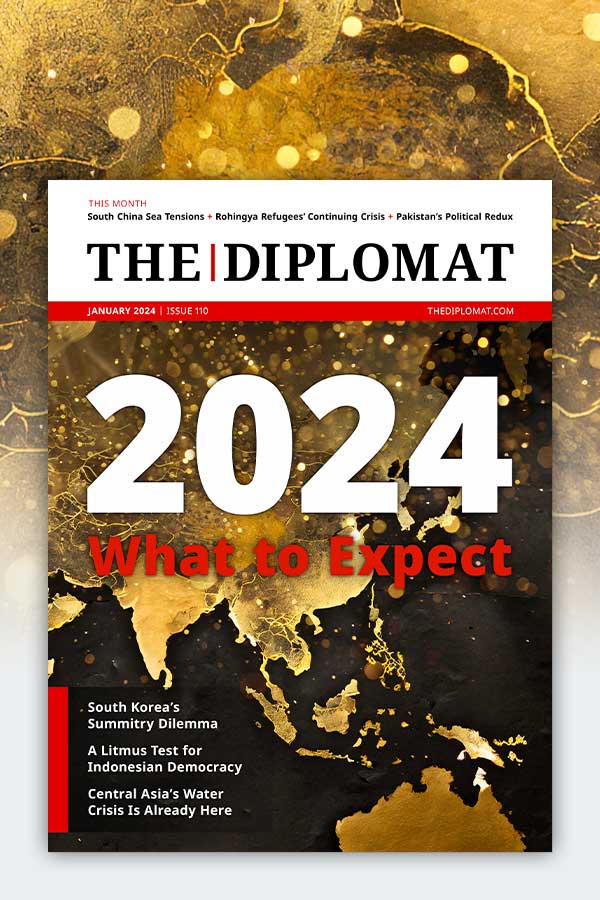| Welcome to the latest issue of Diplomat Brief. This week our top story explores Bhutan’s plan for a new economic hub: the Gelephu Special Administrative Region. We also have an interview with Soo Kim, a principal technical advisor at LMI and a former analyst at the Central Intelligence Agency, on the strategic ramifications of North Korea’s new approach to the South. |
| Story of the week | ![[object Object]](https://thediplomat.com/diplomat-brief/2024/vol04/images/feature.jpg?v=3) | Economy Gelephu: The World’s First Mindfulness City in BhutanWhat Happened: Bhutan’s King Jigme Khesar Namgyel Wangchuck made a major announcement in his address on Bhutan’s National Day, December 17, last year: plans for a new city, the Gelephu Special Administrative Region. The ambitious plan will see 1,000 square kilometers – an area bigger than all of Bhutan’s existing cities – developed into a “Mindfulness City,” to serve as a new economic hub for the country. Our Focus: According to King Khesar, Gelephu will offer more than “a conducive business environment and compelling incentives” for investment: “It will be a Mindfulness City, encompassing conscious and sustainable businesses, inspired by Buddhist spiritual heritage, and distinguished by the uniqueness of the Bhutanese identity.” The idea is to galvanize Bhutan’s economy by attracting investment in cutting-edge industries like bioscience, data science, education, and renewable energy – all without sacrificing Bhutan’s environment and traditional culture. In that sense, it echoes Bhutan’s decision to pursue only “high-end” tourism, a way to capitalize on the tourist industry while not overtaxing the small country’s resources. What Comes Next: The announcement received little fanfare abroad, but attracted major attention within Bhutan. At the time, the country was in the middle of an election season, and the ongoing economic crisis was the major issue of the campaigns. The King’s personal involvement in the Gelephu project sets it up for success, regardless of changes in government – Bhutanese tend to rally around their monarch in national projects, like the De-suung national volunteer program. In creating Gelephu, King Khesar is “challenging the narrative that Bhutan is tiny and without economic heft.” The country’s future depends on it. Read this story |
| Behind the News | INTERVIEW Soo KimSoo Kim, a principal technical advisor at LMI and a former analyst at the Central Intelligence Agency, on Kim Jong Un’s decision to abandon Korean unification as a long-term goal: “Kim, no longer anchored to his father and grandfather’s unification policy, can strike on his own and is ready to wager some big bets in foreign policy. What this means for the region, of course, is greater uncertainties about when and how Kim might provoke instability.” Read the interview |
| This Week in Asia | Northeast Asia Japan Debates Disaster ResponseIt’s been over three weeks since a major earthquake hit Japan’s Noto Peninsula. While the death toll – and thus the political fallout – was far behind historic quakes like the 2011 East Japan earthquake and the 1995 Kobe earthquake, Japan’s response has still sparked questions. In particular, it’s reignited the debate over whether Japan needs its own dedicated disaster agency, akin to FEMA in the United States – in part because the current set-up stretches Japan’s Self-Defense Forces too thin. Find out more | South Asia The Electoral Politics of India’s Ram MandirOn January 22, Indian Prime Minister Narendra Modi headlined the consecration ceremony for the Ram Mandir, a Hindu temple marking the birthplace of the deity Ram (and controversially built after a mob demolished a Muslim mosque that had occupied the site since the 1500s). Critics decried the politicization of a religious ceremony, warning that it marked a sharp turn away from the secular nature of the prime minister post. But for most Hindus, the ceremony was a joyous occasion brought about by Modi’s personal intervention – and therefore is likely to buoy the BJP’s election prospects. Find out more | Southeast Asia Singapore Minister Charged With CorruptionLate last week, Singapore’s former transport minister was charged with multiple offenses, including corruption, in the first graft case involving a cabinet member in nearly four decades. The charges against S. Iswaran, which came seven months after the government announced that he was under investigation, include two counts of corruption, one of obstructing justice, and 24 of obtaining “gratifications” from hotel tycoon Ong Beng Seng. Nearly all of them involve Iswaran’s alleged receipt of tickets to exclusive events, including the Singapore Grand Prix and West End theater productions, in exchange for providing business favors to Ong. While the accusations against Iswaran are minor by the prevailing regional standards, the Singaporean authorities, which pride themselves on their clean governance, are likely to make an example of him. Find out more | Central Asia Kyrgyzstan's Foreign Representatives Bill Moves Another Step ForwardAfter passing in its first reading in October 2023, this week Kyrgyzstan’s controversial “foreign representatives” bill passed its second reading in committee. The bill almost entirely copies Russia’s 2012 “foreign agents” law in tightening government control of NGOs. It will next be presented to the full parliament, though precisely when is not yet known. The administration of President Sadyr Japarov supports the bill, meaning that if it gets to his desk it’ll surely be signed into law. Kyrgyzstan's authoritarian spiral continues to turn. Find out more |
| Visualizing APAC |  | Security forces patrol in Dhaka after a rally by the Bangladesh Nationalist Party on Oct. 28 2023. See the full picture |
| Word of the Week | Politics ビッグモーター化Biggumōtaka, “Big Motor-fication” in Japanese, is a term coined to refer to blind profit-seeking at all costs. The term obliquely refers to a corruption scandal involving the Big Motor chain. Find out more |
|  |
![[object Object]](https://thediplomat.com/diplomat-brief/2024/vol04/images/feature.jpg?v=3)

